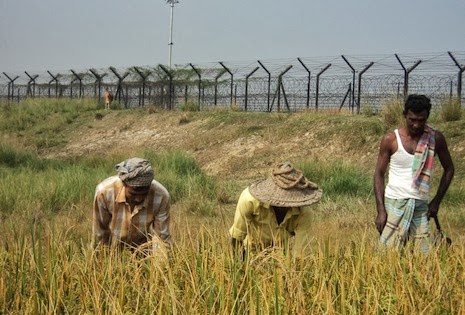 |
| Rana Plaza might prove to be the wake-up call required to fix Bangladesh garment sector, but at a huge cost |
With the
rubble cleared and the dust settled, all seemed quiet at the former eight-story
Rana Plaza site, home to a bank, shops and five garment factories before it
collapsed last month, killing 1,129 workers and injuring about 2,500.
Only a
few dead roses hang from the fence around the building alongside several altars
erected by friends and family grieving in the wake of the April 24 tragedy.
On that
fateful day, hundreds of dead and wounded were pulled out from among the
smashed walls and furniture of the destroyed tower as wailing relatives watched
in horror. The scene at the nearby Adhar Chandra High School was equally
heart-wrenching, and pathetic.
It was
here that authorities gathered bodies. About 300 remain unidentified.
I felt
ashamed – as the building owners and factory bosses themselves should – because
collectively, as a nation, Bangladesh had
demonstrably failed to give any kind of protection to its workers and it had
shown this shameful truth in grim close-up for the whole world to see.
That
this was not the first ‘accident’ of its kind is perhaps the biggest disgrace.
Nearly
2,000 workers have died in fires, stampedes and other accidents in garment
factories in recent times, all tragedies which were avoidable. In none of these
cases was a factory owner or boss punished, many of whom appear to be guilty of
cutting corners for profit.
Bangladesh’s roughly four million garment workers earn a minimum wage of
just US$38 per month, half the level in Cambodia, for example, which itself has
received scrutiny over poor labor conditions in recent years.
For the
millions of poor Bangladeshis who leave their rural homes to seek financial
independence in the shape of a stable job in a garment factory, in reality they
are simply condemning themselves to the closest thing to slavery in today’s
globalized world.
This is
an industry worth $19 billion to Bangladesh, very
little of which trickles down to those who put in most of the work and shoulder
most of the risk: Not financial, perhaps, but mortal, certainly.
Even in
death, Bangladeshi garment workers are treated like slaves. According to
current labor law, a factory owner is supposed to pay 100,000 taka ($1,250)
compensation for a worker’s death.
Since
the industry accounted for 1,129 additional deaths last month there are signs
that, finally, some are saying enough is enough as Bangladesh comes under strong pressure from labor groups, the media, some
consumers and even some garment buyers which employ the services of factories
like those in Rana Plaza.
The US
government is holding a hearing which will determine whether Bangladesh will continue to enjoy Generalized System of Preference (GSP)
access to the world’s largest economy.
“Bangladesh has two choices. They can go to the future and they can assist
in providing safe working conditions, safe factories and programs for fire
prevention,” said Congressman George Miller who visited Bangladesh this week as part of the US enquiry into the country’s GSP
status. “Or they can struggle in the past and lose the value of the Bangladesh label.”
The
European Union, Bangladesh’s
largest market by export value, has threatened to revoke duty-free access if
the industry doesn’t reform.
In
response to the threat of serious damage to the country’s biggest earner, the
government has hastily inspected all factories across the country, promised to
set up a separate wage board and amended the labor code. Money talks,
especially amid threats that it could disappear.
But
question marks remain as to whether these changes are substantive or mere
window-dressing. Bangladeshi media remains unconvinced.
“Theoretically,
laborers can go to court to file a complaint against their bosses. But in
practice it is expensive and too lengthy a process that most workers can’t
afford it,” said Jafrul Hasan, a lawyer.
Unsurprisingly,
the industry body – the Bangladesh
Garments Manufacturers and Exporters Association – appears to be trying to
protect their members' interests behind the scenes amid the backlash.
A key
dilemma is whether it is right and ethical for global retailers to pull out of Bangladesh altogether? A superficial answer would be ‘yes.’
Just
before the Rana Plaza tragedy, the Walt Disney Company – the largest media
conglomerate in the world – stopped sourcing products from Bangladesh in the wake of a fire at Tazreen Fashions last year which
killed 112 people.
But
having profited from these workers for decades, is it really right for
companies like Disney to wash its hands of Bangladesh? The
result is that this giant company has shunned its responsibility and let slip
the leverage it once had to promote tangible reforms for the better.
“On the
labor issue, absolutely, buyers have a critical role and they must be engaged,”
Wendy Sherman, US undersecretary of state for political affairs, said during a
visit to Bangladesh this
week.
Major
European retailers including H&M, Inditex, Primark, C&A, Tommy Hilfiger
and PVH, Tesco, Benetton, Marks and Spencer and Carrefour, have all signed an
accord on fire and building safety in Bangladesh.
Tuesday
was the deadline to sign onto the accord, but at least 14 North American
retailers including Walmart, Gap, Target and JC Penny, joined by Asia’s largest
retailer Uniqlo, declined to participate, citing legal concerns.
The
agreement demands a five-year commitment from participating retailers to
conduct independent safety inspections of factories and pay up to $500,000 per
year toward safety improvements.
This
amount is nothing to global giants like Walmart. But it would surely contribute
to improving the hellish working conditions for garment workers in Bangladesh. It would surely make all the difference for them.
Third World View is the pseudonym of a commentator based in
Dhaka, Bangladesh






.jpg)


.jpg)





